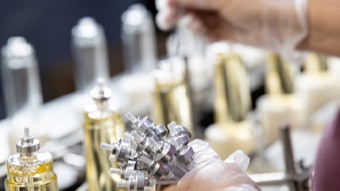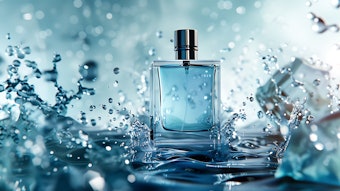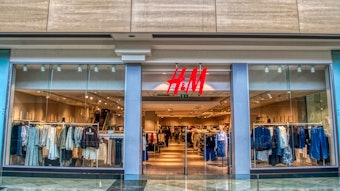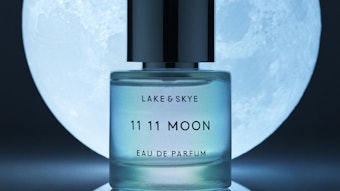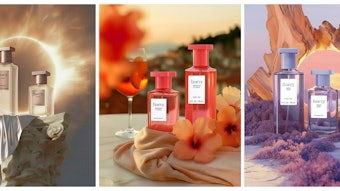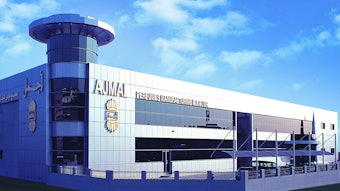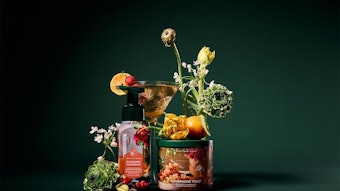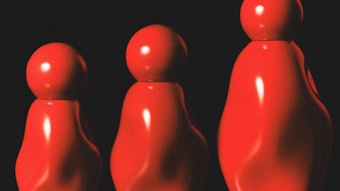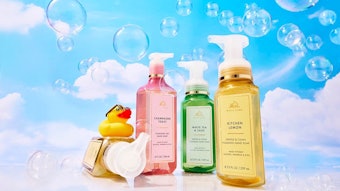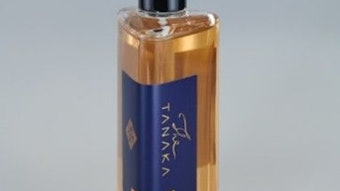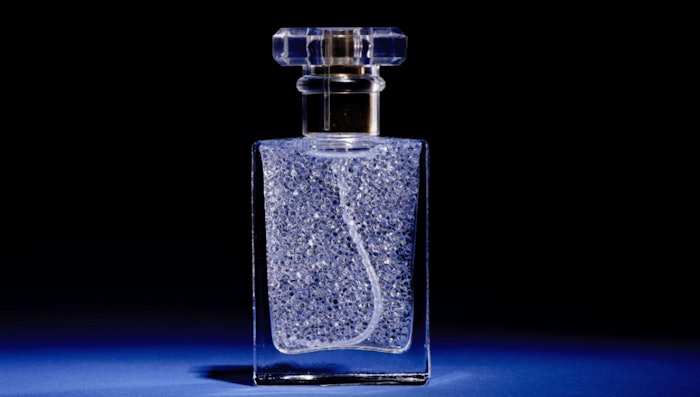
Perfume house Luzi partnered with Microcaps to market Microcaps’ fragrance encapsulation technology under the trademark Lupearlsa. The luxury water-based fragrance tech is said to not contain ethanol, or any other solvents or surfactants.
Related: Clean Reserve's H2Eau Water-based Fragrances Tap Sensitive Skin Market
Lupearls is designed to be a sensorial experience releasing its scent slowly over time, leaving a smooth and gentle feeling on the skin. The fragrance technology is biodegradable, vegan and halal-compliant. Perfumer & Flavorist+ connected with the Lupearls team and the head of Business Development at Microcaps AG, Fabian Dubler, to better understand the technology.
Read this article in the March 2024 issue!
Can you describe the concept of encapsulation technology as a fragrance delivery system?
Luzi Team [LT]: Regarding Lupearls, we can claim that this technology was developed to create a homogeneous mixture of fragrance oil in water.
The product should not precipitate and should not contain any solvents such as ethanol, solubilizers or surfactants. The haptic after spraying the Fine Fragrance on the skin should not be sticky, but refreshing, cool and comforting.
Furthermore, a high fragrance concentration was desired in order to achieve a strong and long-lasting performance. The capsules also needed to be natural, readily biodegradable and as sustainable as possible.
For Lupearls parfum d'eau the technology used is core-shell encapsulation based on a well-known from the food industry, alginate compound.
The release of the fragrance is triggered mechanically while spray the slurry out of the flacon. Since the nozzle of the sprayhead is smaller than the capsule size, it is broken by force immediately and release the fragrance within the mixture.
 Fabian Dubler, Head of Business Development at Microcaps AGcourtesy of Fabian Dubler
Fabian Dubler, Head of Business Development at Microcaps AGcourtesy of Fabian Dubler
Fabian Dubler [FD]: We developed a water-based, ethanol-free delivery technology that encapsulates fine fragrance oil into alginate pearls surrounded by water. This makes it possible to create natural and vegan perfumes that feel soothing and refreshing on the skin. At the same time, it allows to achieve much higher fragrance concentration in the final product than conventional water-based formulations. So, for the first time an ethanol-free perfume can hold up with ethanol-based perfumes when it comes to fragrance intensity and long-lastingness. Last but not least, the luxurious alginate pearls also look great in the bottle. This creates a completely new overall fragrance experience that will redefine the possibilities of ethanol-free perfumes.
What have been some of the key innovations in encapsulation technology over the last few years? What were the drivers of the innovation?
Simply by observing the widespread use of encapsulation technology (including fragrance encapsulation), we can say that an important aspect was the development of biodegradable products to avoid microplastics. This development mainly concerned the well-known market for fragrance encapsulation in connection with laundry products.
Our Lupearls technology is not suitable for laundry applications and was developed in a different context.
FD: One of the recent key innovations is the use of microfluidic emulsification. Microfluidic encapsulation opens a whole world of possibilities and is still only at the beginning to grasp its full potential. Another big trend in the industry of fragrance encapsulation is the focus on sustainability and functionality, with an emphasis on natural products for more health-conscious consumers and the protection of fragrances from external impact.
What are some of the limitations of encapsulation technology?
LT: In connection with encapsulation, also with fragrances, it is important to know in which application these fragrances will be used and at which time and trigger the fragrance is to be released.
Accordingly, one limitation is the suitability and stability of the capsule. In our Lupearls example, this means that the capsule must be able to be mixed homogeneously with water. It has to be stable enough not to break inside the bottle, for example during production or transport of the product to the consumer. However, it must break completely as soon as it is sprayed out and must not stick or block the spray head.
The fragrance to be encapsulated must separate well from water and must not be water-soluble in order to obtain spherical capsules of the same size that do not bleed or cause problems during storage.
There is also a limit to the loading and packing of the capsules in the matrix. A dosage of up to 25% fragrance in the product is currently possible. Higher dosages harbor a risk of instability of the capsules due to too little free space or too little liquid in the matrix.
FD: Encapsulation of ingredients can be complex, and not all ingredients work well in the encapsulation process. Some ingredients can be damaged or lost during the process. In our example it is crucial that we collaborate very closely with our customers to analyze and test each ingredient they want to use in their final product. However, for our customers encapsulation still comes with many more new opportunities than restrictions. In the past, water-based perfumes had limits on the amount of fragrance oil and the overall sensory experience. Now, with Microcaps’ encapsulation technology there is a solution that brings in game-changing new possibilities. Just imagine being able to create a completely new fine fragrance product through encapsulation. In the end, the challenges are small compared to the amazing opportunities this innovation brings to our customers.
From your perspective, what does the future of fragrance delivery technology look like?
LT: One important topic now and in the future of fragrance delivery technology (especially in the product range of Laundry Applications and typically used fragrance encapsulation within this field) is the biodegradability of polymers and the topic of avoiding microplastic. As presented by Mr. Andreas Künkel from BASF last October at the SEPAWA congress, the fundamental understanding of the biodegradation of polymers and the respective OECD methods is a key challenge. At the moment e.g. OECD 301 is defined as the biodegradability of more than 60% of the substance after 28 days. But maybe polymers just need additional time to decompose completely, since they are really huge molecules, it may be 60% after 54 days. So maybe an additional OECD method would be useful?
However, in my opinion, the topic of sustainability needs to be and therefore will be very closely connected to the topic of encapsulation.
There are very elegant and environmentally friendly solutions like LUPEARLS™ PARFUM D’EAU (without any microplastic but still encapsulation technology) for Fine Fragrance without alcohol.
There may be other more complex applications such as laundry and requested release mechanisms in the future, some physical aspects where encapsulation may provide a simple solution.
FD: For a long time, fine fragrances have stuck to the same delivery methods because there weren't many alternatives. But now, for the first time, it is possible to offer a product that performs like traditional ethanol-based perfume while having a completely unique appearance and coming with a natural, vegan, and skin-friendly formulation. This paradigm shift will redefine the future of fragrance delivery technology for sure. Currently, we're just starting to explore the possibilities that this new technology offers. Microcaps firmly believes that encapsulated fine fragrance products will play a much larger and lasting role as a delivery system in the future, providing consumers with natural, health-friendly products that bring a breath of fresh air into a market that is always on the lookout for innovative and outstanding products.
Are there any examples of recent innovations that can point to untapped white space in the segment?
FD: A recent breakthrough innovation is “Lamar Caviar by Kajal,” which launched just a few weeks ago. This unique perfume stands out as the first ever water-based, ethanol-free scent that is based on Microcaps’ Perfume Pearls technology. Lamar Caviar offers its consumers a luxuriously intense scent that is natural, vegan, halal and delivered in a new, encapsulated form.
This innovation shows how combining new technology and a commitment to offering more value to end-consumers can transform a market towards sustainability and natural products. Microcaps is excited to support this shift through our unique encapsulation technology and our expertise in microencapsulation.
aLupearls is a trademark of Luzi Perfume Pearls is a trademark of Microcaps AG ”
